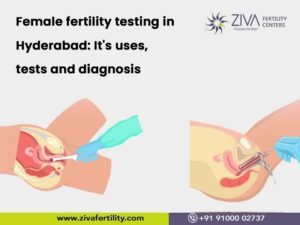For a successful conception, the timing of the intercourse is crucial. For timing the intercourse, ovulation tests are safe since they can give an accurate estimate and improve pregnancy rates in women. This method gives the best results for those under 40 who have been trying for less than a year. Timed intercourse gives better results as compared to those without ovulation prediction.

When is the conception window for women?
The most fertile period is the time when you’re most likely to get pregnant. For most women, this period is five days before ovulation, along with the day of ovulation and one day after it. Every month, this calculation has to be done until one gets pregnant (of course, if that’s what they want). You will know the optimal time to have sex if you’re trying to conceive.
It’s good to understand your menstrual cycle when you are trying and want to track ovulation. The menstrual cycle is the mechanism of the body to prepare for pregnancy. The menstrual cycle begins on the first day of your period and restarts when your next period begins. The whole cycle is for 28 days, but even if it runs for 21 to 35 days, it is considered normal.
During this period, there are hormone fluctuations, and about midway through this period, one of your ovaries releases a mature egg. The egg descends to either of the fallopian tubes. The egg waits there to be fertilized by sperm while the uterine lining thickens. The uterus is now ready for implantation of the fertilized egg.
However, if you had not conceived, two things could have happened.
- No fertilization happened
- The embryo (fertilized egg) didn’t implant into the uterus.
In either of the cases, the uterine lining sheds, and that’s when you get your period.

How do I know when I am ovulating?
So, ovulation is the time when a mature egg is released by the ovaries. So, if we know this time, you will know the time to have intercourse. Below, we have listed the three methods if you’re doing natural family planning.
Calendar method
In the calendar method, you track the duration of the menstrual cycle. So start by marking the first day of your period on a calendar. The duration of the menstrual cycle is the duration between the first day of consecutive periods. Do this tracking for at least six months to get good data. There are many period-tracking apps which can help you.
Ovulation starts 12 to 14 days before the start of the next menstrual cycle. The fertile window is five days leading up to ovulation, plus the day of ovulation and the day after ovulation. So, every month, you have seven days with the best chance to get pregnant.
But this month does not work for those with irregular periods and if the length of your menstrual cycle varies from month to month.
Cervical mucus method
The various hormonal changes during your menstrual cycle will affect the amount and consistency of your vaginal mucus. So look at your vaginal mucus each day and record the results on a chart. When the mucus becomes heavy, wet and slippery, you are probably ovulating. To understand simply, it will be similar to raw egg whites.
Try this first for at least one menstrual cycle. You can ask our expert ZIVA Fertility doctors to know what to look for. We will guide you on what to look for and how to chart it.
Ovulation predictor kits
Ovulation predictor kits are like at-home pregnancy kits. They are best suited when the periods are regular, but you are not still quite sure if you are seeing natural signs of ovulation. The kits test your urine for luteinizing hormone. From the time the kit shows positive, the actual ovulation will start within 24 hours, indicating that you’re fertile and should have sex. However, if the periods are irregular or if you have PCOS, these kits are not reliable.
Basal body temperature
Even before you get out of bed in the morning, take your temperature. A simple basal body thermometer will work. You can measure the temperature either in your mouth or your rectum. A basal thermometer sensitivity is higher, and it can measure body temperature to a tenth of a degree.
A woman’s basal body temperature increases by 0.5 degrees Fahrenheit during ovulation. So start tracking from the days leading up to ovulation so that after ovulation, you will see a sustained rise in your basal body temperature.
Maintain a tracking sheet and write your body temperature down each day. Maintain this sheet for at least three months before using this method for family planning.
This method is only good for tracking the pattern of ovulation, so it is helpful when you are trying to conceive. This is not a suitable method for timed intercourse since, by the time you identify the rise in your temperature, you’ve already ovulated.

When trying to get pregnant, should I have sex before, during or after ovulation?
Below is the recommendation for the best chances of pregnancy:
Have sex every day or every other day during the following:
- Five days leading up to ovulation
- Day of ovulation
- Day after ovulation
There’s a lot of misinformation regarding the best ways to get pregnant. Applying too much lubrication increases your odds of conceiving and may negatively affect sperm and prevent them from reaching the egg. So before using any of the sex products, consult a health care provider about which lubricants to avoid.
How do I know the time for intercourse if I have irregular periods?
Irregular periods mean that there is no definitive gap between the periods. These types of irregularities should be immediately sorted out by your GYN/OB or a fertility specialist. Irregular periods cause hormonal imbalances and make it more challenging to get pregnant using natural family planning methods.
The bottom line on “Trying for pregnancy: Learn more about the role of timed intercourse.”
By following simple tracking methods and with the support of fertility experts such as those at ZIVA Fertility clinics, the journey to get pregnant can be quite beautiful. We will help you understand your ovulation cycle, menstrual cycle, best time for intercourse, etc. Please contact us at +91-9100002737, +91-9392834024
Info@zivafertility.com, or visit our website https://zivafertility.com/.
















